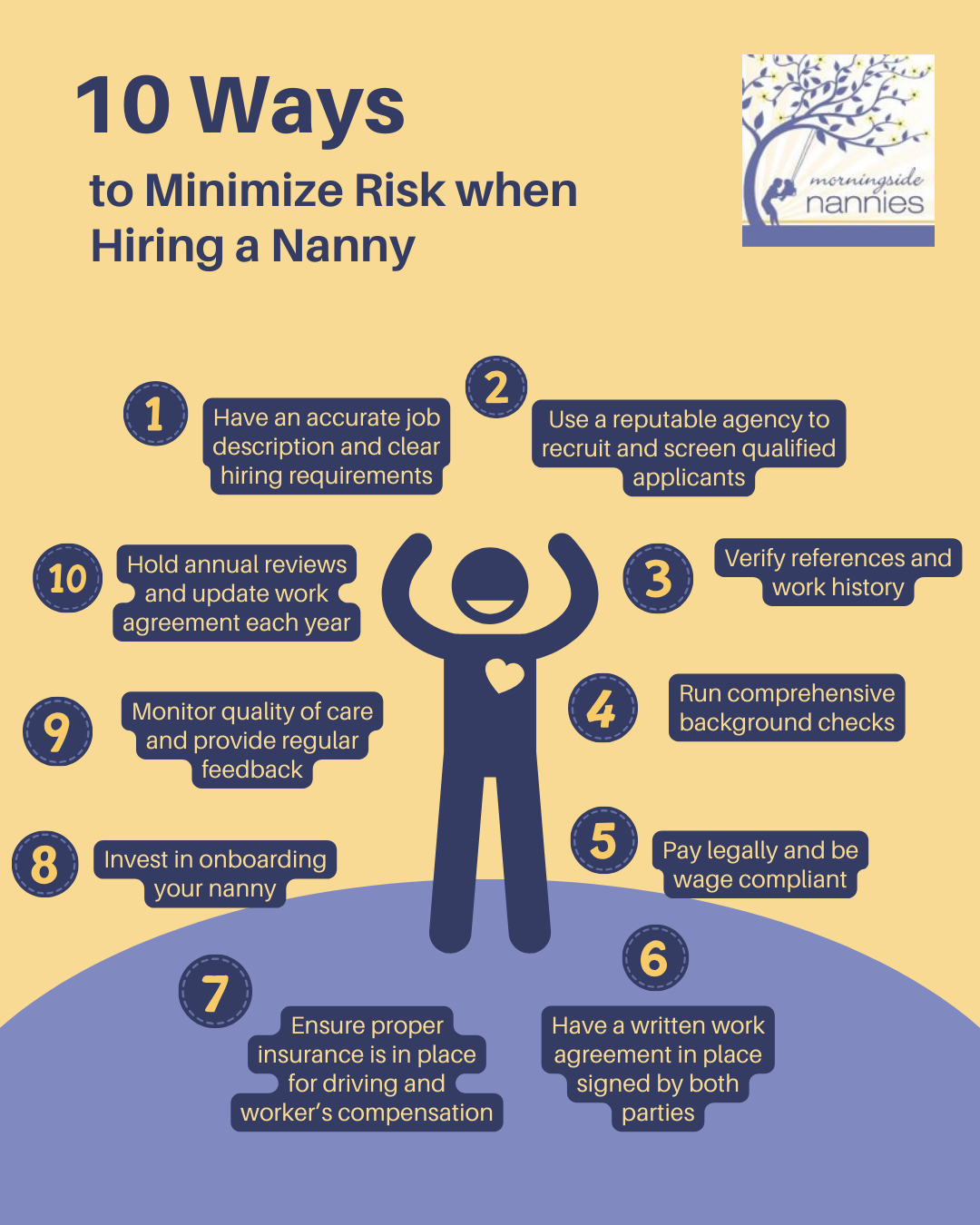10 Ways to Minimize Risk When Hiring a Nanny
Hiring a nanny is one of the most significant decisions a family will make. You are inviting someone into your home and trusting them with the safety,  care, and development of your children. While there are many compassionate and highly skilled caregivers, there is also risk if the hiring process isn’t handled carefully.
care, and development of your children. While there are many compassionate and highly skilled caregivers, there is also risk if the hiring process isn’t handled carefully.
By taking proactive steps, you can create a healthy, legal, and positive working relationship for everyone involved.
Here are 10 proven ways to minimize risk when hiring a nanny:
1. Have an Accurate Job Description and Clear Hiring Requirements
Start by defining exactly what you need in a caregiver. Outline specific responsibilities such as childcare duties, household tasks, transportation, or homework help. Identify non-negotiable requirements, such as CPR/First Aid certification, driving experience, or infant care knowledge. Include information about schedule, benefits, and household expectations. An accurate job description helps attract the right candidates and prevents misunderstandings later.
2. Use a Reputable Agency to Recruit and Screen Qualified Applicants
Working with a reputable nanny placement agency can significantly reduce hiring risk. Agencies pre-screen candidates, verify credentials, and conduct initial interviews before you even meet them. They guide families through the process, providing expertise on compliance, benefits, and best practices. If issues arise after the hire, agencies often offer replacement guarantees and ongoing support. While there’s a cost to using an agency, the peace of mind and it provides are invaluable.
3. Verify References and Work History
Never skip this step. Speaking directly with former employers is essential. Confirm dates of employment, duties, and reasons for leaving. Ask about reliability, professionalism, and how the nanny handled challenges. Be wary of candidates who cannot provide verifiable childcare work references. Reference checks reveal a candidate’s past performance and can help predict future behavior.
4. Run Comprehensive Background Checks
Protect your family by running thorough, multi-level background checks.
This should include:
- National criminal record searches,
- Sex offender registry searches
- Driving record checks
- Identity verification using government-issued ID.
A high-quality background check goes beyond surface-level searches and provides the security you need.
5. Have a Written Work Agreement in Place, Signed by Both Parties
A detailed work agreement sets clear expectations and protects both you and your nanny.
Include:
- Job responsibilities and schedule.
- Compensation and benefits (paid time off, holidays, guaranteed hours).
- Confidentiality agreements and household rules.
- Procedures for termination and conflict resolution.
This document serves as a reference point throughout the employment relationship.
6. Ensure Proper Insurance Is in Place
Having the right insurance reduces liability and protects everyone involved. If your nanny will drive your children, confirm they are covered under your auto insurance policy or have appropriate coverage of their own if using their own vehicle. Consider workers’ compensation insurance, which may be required by law in some states and provides protection in case of on-the-job injuries.
Proper coverage shows you value your nanny’s safety and shields your family from potential legal complications.
7. Invest in Onboarding Your Nanny
Even experienced caregivers need guidance to understand your family’s unique routines and expectations. Review safety protocols, including allergies, medications, and emergency contacts. Walk through daily schedules, household rules, and discipline approaches. Provide resources and introductions to make your nanny feel like part of the team. Strong onboarding reduces stress and sets everyone up for success.
8. Pay Legally and Be Wage Compliant
Nannies are employees, not independent contractors.
- Pay through a payroll system and issue a W-2 each year.
- Follow federal, state, and local wage laws, including overtime regulations.
- Provide legally required benefits where applicable.
Paying legally not only protects you from IRS penalties but also builds trust with your nanny.
9. Monitor Quality of Care and Provide Regular Feedback
Once your nanny starts, stay actively involved in their success.
- Schedule weekly or monthly check-ins to discuss your child’s progress and any concerns.
- Provide constructive feedback and listen to your nanny’s perspective.
- Keep communication open and respectful to build a strong partnership.
Regular monitoring ensures your child’s needs are consistently being met.
10. Hold Annual Reviews and Update the Work Agreement Each Year
An annual review creates an opportunity to reflect on the past year and plan for the future.
- Discuss performance, goals, and any needed changes in responsibilities.
- Review wages and benefits to ensure they remain fair and competitive.
- Update the written work agreement to reflect new expectations or family needs.
This proactive step prevents misunderstandings and strengthens your relationship with your nanny.
Hiring a nanny comes with great responsibility—but also great reward. By following these ten steps, you can minimize risk, protect your family, and create a safe, nurturing environment where your children can thrive.
Taking the time to hire carefully and manage the relationship professionally will set the foundation for a lasting and positive partnership with your nanny.
← Why a Thorough Nanny Screening Process Isn’t Just Necessary—It’s Essential | 5 Things that Make Parents Cringe →
Comments are closed.



